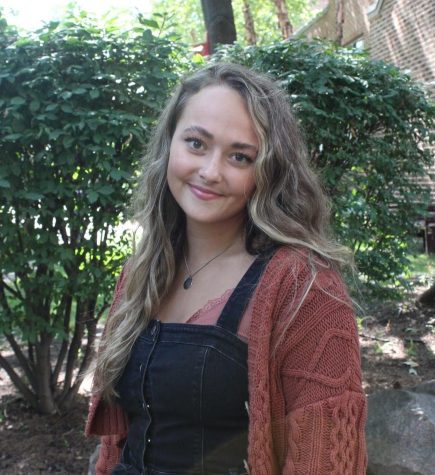Topic of abortion leads to duel
November 9, 2021
On Gannon’s campus at the end of October, there was what has been referred to by students and staff as a “chalk war” on the path of A.J.’s Way, which caused tremendous conflict amongst opinionated students.
The original anti-abortion art spread from the brick walkway across sidewalks leading to the Nash Library, where some took to splashing water or defacing “life” with “choice” as a response.
In chalk, students from school organization GU Students for Life wrote anti-abortion messages and created anti-abortion art on these campus canvases, which was then met with pushback from abortion-rights students.
Ellen Madden, president of the Women’s Issues Club and a senior biology major, weighed in on why she thinks that this art promoted such controversy.
Madden said that the chalk did not affect her personally, but she gathered that the movement made many individuals on campus uncomfortable, especially when rumors began to spread that the event was not pre-approved by campus officials.
Students for Life said the event was approved by Police and Safety.
“There has been an increase in the activeness of the pro-life group that has definitely caused a stir on campus, so I was not surprised to see that people had messed with the chalk drawings,” she said.
“I do not know who did so and think people mainly did it on an individual basis because they were fed up with the pro-life position.”
Aidan Kerlin, president of Students for Life and a junior psychology major, described his club as a secular, civil rights group, not a religious, fundamentalist group, thus labeling the chalk art movement as a demonstration of free speech.
“When I came to Gannon University as a freshman in the fall of 2019, I was impressed with the liberal arts university’s emphasis on free speech that allows students to be open to different opinions and views and, by critically thinking, form their own opinions and values which allow them to become effective and caring global citizens,” Kerlin said.
“I believe that Students for Life’s message is not one of hate, and therefore is a valid opinion that should be allowed to be shared on campus in unison with the university’s mission.”
Sister Carmen Haemmerle, pastoral minister for University Mission & Ministry and adviser to Students for Life, said the club’s purpose is to “promote the beauty and preciousness of each human life, from the moment of conception until natural death.”
On the other hand, Madden deemed the Women’s Issues Club as an organization that focuses on local and global issues pertaining to women, one of those issues being abortion.
Although originally the art upset some on campus, Madden said that she believed both sides of the abortion issue deserved a place on campus.
“It is easy to get caught up and villainize the other side of the debate if you are only allowed to hear from one side,” said Madden.
In response to those shaken by the images, Kerlin acknowledged that the drawings of fetuses could trigger those suffering with the trauma of an abortion.
He validated these emotions and reactions and understood this position as a psychology major and as someone who values mental wellness.
“If someone is legitimately hurt by what they saw, I apologize on behalf of myself and the entire club,” Kerlin said.
Kerlin and the Students for Life club, however, said campus is an appropriate place for their views and art.
“We understand that the emotional decision that many women are forced into is scary and should not be dismissed,” he said.
“This is why we look to empower these women to realize that abortion is not their only option if they wish to heal from sexual violence or succeed in a career.”
To further justify this, Haemmerle spoke to why the chalk art was important for her students and their group, saying that their basic intention was to prompt students to reflect on what life means to them.
“With the chalking of beautiful, life-affirming messages the Students for Life intended to raise awareness, educate and point out that each and every one of us is precious and loved, from day one of our existence,” she said.
Jessica Mando, the adviser of the Women’s Issues Club and a digital content librarian at Nash Library, said that the newly established club was not a strictly an abortion-rights group, and has many anti-abortion members like most clubs on campus.
“I think college campuses are ideal places to have difficult conversations,” Mando said.
“Conversations about difficult topics can be transformative, and what better place to have them than with peers who are also on self-discovery journeys — whether they know it or not.”
To further the place of abortion-targeted conversations on college campuses, with specific regard to Gannon, Haemmerle said university halls are suitable places for snti-abortion discussion to take place because the majority of abortions happen within the college-age demographic.
“This conversation needs to have a place on college campuses,” said Haemmerle, who added that 44% of abortions in America are performed on college-aged women between the ages of 18 and 24.
“This means, 440,000 abortions are done in the college-aged population each year,” she said.
“These are more lives that are ended than U.S. soldiers who died during (World War II).”
Similar to the student leaders, Mando believes that the abortion debate, and a debate of any important issue, deserves equal representation.
Mando urged students, and faculty, to keep an open mind to viewpoints that differ from their own.
“You don’t always know another person’s lived experience, and why they feel certain ways or make certain choices,” Mando said.It is not our place to pass judgment.”







Jessica Mando • Nov 11, 2021 at 7:52 am
The Women’s Issues Club is accepting new members on a rolling basis! If you think it’s something you might be interested in joining, check out our EngageU page to get in touch 🙂 https://engageu.gannon.edu/organization/womensissues